It’s time for another season of college golf, and per usual, we’re kicking off the start of a new fall with Golf Channel’s Brentley Romine revealing his preseason rankings, for both teams and players, while telling you everything you need to know about the best programs in the country, from projected starting lineups to preseason All-Americans (scroll to the bottom).
But first, take note of these important dates:
• May 12-14, 2024: NCAA regionals
(Host sites: Popular Grove GC, Amherst, Virginia; Gold Mountain GC, Bremerton, Washington; Blessings GC, Fayetteville, Arkansas; Montreux G&CC, Reno, Nevada; Karsten Creek GC, Stillwater, Oklahoma; Seminole Legacy GC, Tallahassee, Florida)
• May 23-28, 2025: NCAA Championship
Omni La Costa Resort and Spa (Champions), Carlsbad, California
This embedded content is not available in your region.
And for the women’s top teams and players, click here.
Now, without further ado, let’s get into the big rankings reveal:
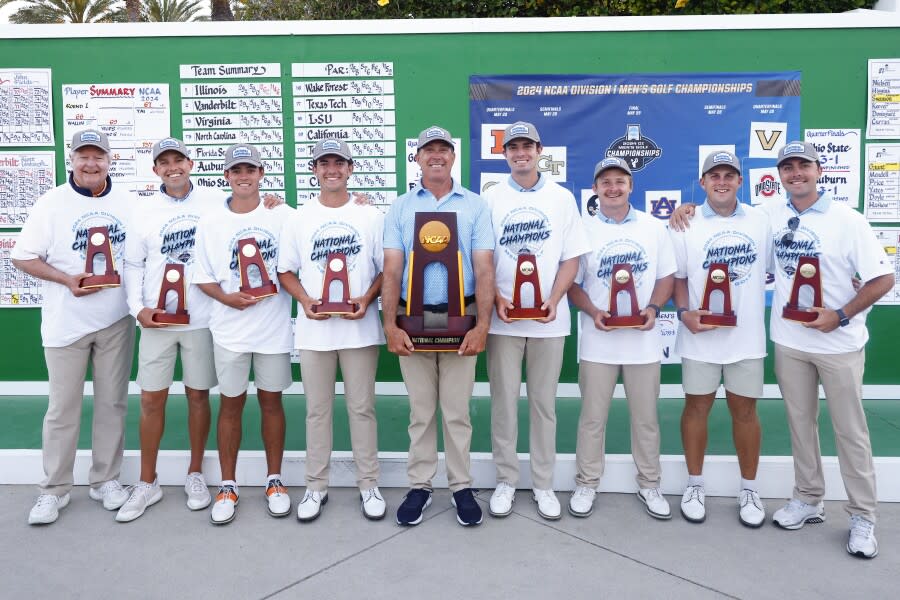
1. Auburn
Final 2023-24 rank: 1
2024 NCAA Championship finish: National champion (sixth in stroke play)
Returning: Jackson Koivun (Soph.), Brendan Valdes (Sr.), Carson Bacha (Sr.), Josiah Gilbert (Soph.), Reed Lotter (Jr.), Cayden Pope (Soph.), Ryan Eshleman (Sr.), Evan Vo (Jr.)
Departed: J.M. Butler, Alex Vogelsong
Arriving: Billy Davis (Fr.), Tyler Spielman (Fr.)
Projected starting lineup: Koivun, Valdes, Bacha, Gilbert, Davis
Scouting report: With COVID years now a thing of the past, the most noticeable change in the college game is the absence of the ridiculous depth that we’ve grown accustomed to. Even some of the best teams in the country have question marks toward the back end of their starting lineups. Of course, that doesn’t apply to Auburn, the defending national champion, which lost just one starter (Butler). It’s a big loss but one that’s easier to stomach considering Koivun returns after sweeping all the postseason individual awards (Haskins, Nicklaus and Hogan) as a freshman. Koivun is just three PGA Tour University Accelerated points away from a PGA Tour card next summer, so one more award like that or a win at nationals could see him leave two years of college eligibility on the table. But that’s a conversation for the end of this season. For now, he’ll aim to somehow better his two wins and 11 other top-6 finishes from last season. Valdes, also a first-team All-American last year, is third in the regular PGA Tour U rankings, and he enters the fall as a recent U.S. Amateur quarterfinalist. Bacha missed some tournaments last fall while undergoing some swing tweaks, but he found his form mid-spring with four straight top-6s. His summer has been equally impressive with top-15s at the Sunnehanna and Southern amateurs, a match-play showing at the U.S. Amateur and a playoff loss at the Western, where he would’ve made the Sweet 16 easily had it not been for a two-shot penalty for accidentally having the slope function to his rangefinder turned on. Gilbert could be the next first-team All-American for this program, as he took off after finally cracking the lineup in April. He went 3-0 in match play at SECs and then tied for fifth at the NCAA Baton Rouge Regional. This summer he was runner-up at the Alabama State Amateur and top 12 at the Northeast, Trans-Miss and Southern amateurs. The fifth spot is very much up for grabs. Davis is probably the most likely candidate, though the hotshot recruit has some work to do physically to withstand a full college schedule. Vo is a wild card, as he missed all of last season after sustaining a serious knee injury while playing basketball. For Auburn, the key to backing up the school’s first NCAA Championship is doing much of the same. Only now, the Tigers won’t have even the slightest of chips on their shoulders. “They’ll be focused,” head coach Nick Clinard said. “I can promise you that.”
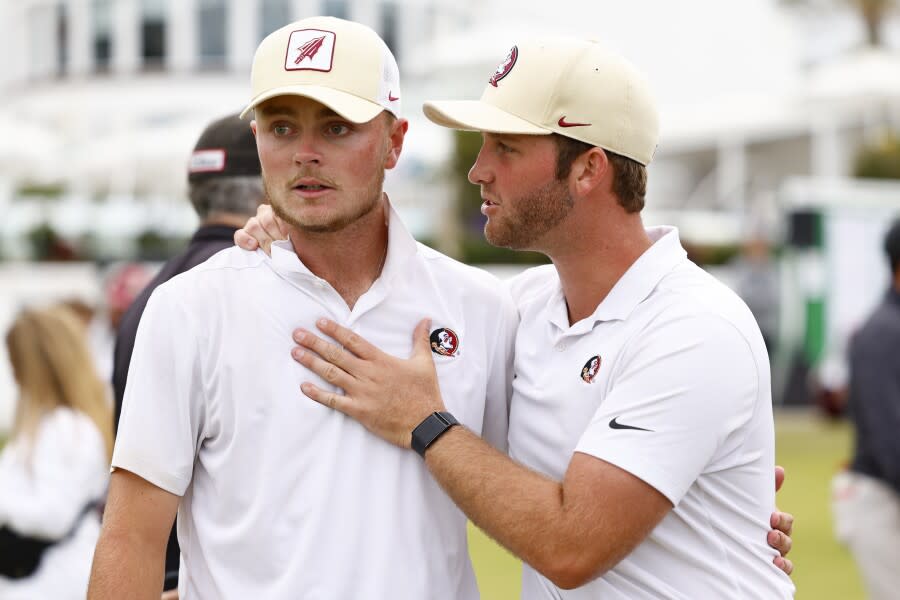

2. Florida State
Final 2023-24 rank: 5
2024 NCAA Championship finish: Runner-up (fifth in stroke play)
Returning: Luke Clanton (Jr.), Tyler Weaver (Soph.), Gray Albright (Sr.), Jack Bigham (Jr.), Michael Mays (Sr.), Patrick McCann (Sr.), Wilmer Edero (Soph.), Carson Brewer (Soph.)
Departed: Frederik Kjettrup, Cole Anderson, Brett Roberts
Arriving: Andrew McLauchlan (Jr., transferred from Wake Forest), Drew Jones (Fr.)
Projected starting lineup: Clanton, Weaver, Albright, Bigham, Mays
Scouting report: The Seminoles overcame early injuries and other competitive absences to peak at the perfect time last season. They won or finished second in five straight tournaments leading into the NCAA Championship, where their run ended in the NCAA final as Luke Clanton lost the deciding match to Auburn’s J.M. Butler to seal Florida State’s national runner-up finish and the Tigers’ first NCAA team title. Now, Florida State must replace three veterans from that team – graduates Frederik Kjettrup, Brett Roberts and Cole Anderson. It’s easier to do when Clanton, now a junior, has ascended to No. 1 in the world amateur rankings. Clanton, who had his college breakout last spring with three straight wins, is the unquestioned Haskins Award favorite entering the fall after a summer that featured three top-10s in PGA Tour events and a T-41 at the U.S. Open. There’s a decent chance this could be Clanton’s last college season as he’s just six PGA Tour U Accelerated points away from earning a PGA Tour card, and he could do that by next summer if he wins at least two of the Haskins, Hogan and Nicklaus awards, or captures at least one of those along with winning the NCAA individual title. You can bet Clanton will give it all he’s got. “Luke is coming off arguably the best summer of any amateur player in a very long time,” head coach Trey Jones said. “I know Luke has a lot of lofty goals this year. I know he will work hard and be driven to achieve his goals. Handling new expectations and busy schedule will be a key.” As for Clanton’s supporting cast, much will be expected out of reigning ACC freshman of the year, Tyler Weaver, who subbed in during the NCAA Championship and went 3-0 in match play. Weaver is a work horse – fitting considering he’s the son of a champion jockey – though his summer left a lot to be desired as a non-factor at both the British and U.S. amateurs. Gray Albright is back for a fifth year, is a proven winner at the college level and provides the Seminoles with a constant in the middle of the lineup. Jack Bigham is a former Walker Cupper from England who saw a ton of action as a freshman, only to play in just seven events as a sophomore. The Seminoles’ NCAA title hopes likely rest on Bigham and senior Michael Mays, who both had standout summers – Bigham was a British Amateur semifinalist while Mays posted a top-6 at the Southern Amateur and T-86 at the U.S. Amateur, where he was a spot out of the playoff. Bigham and Mays will need to step up to take some pressure off Clanton, though don’t count out McLauchlan, who had four top-10s as a freshman at Wake, breaking into the lineup.
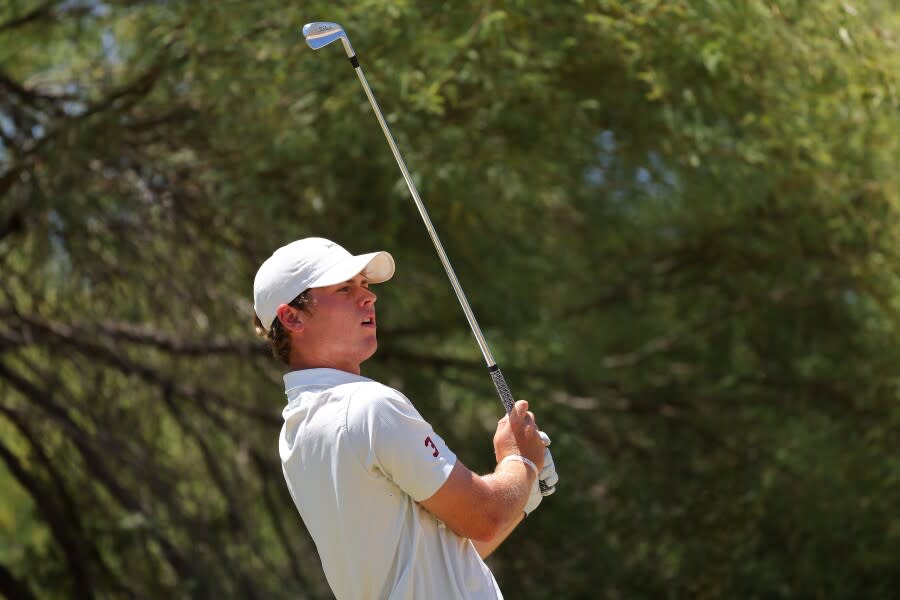

3. Oklahoma
Final 2023-24 rank: 12
2024 NCAA Championship finish: Ninth
Returning: Drew Goodman (Sr.), Jase Summy (Jr.), Ryder Cowan (Soph.), Stephen Campbell Jr. (Sr.), Jaxon Dowell (Sr.), PJ Maybank III (Soph.), Matthew Troutman (Jr.), Jake Hopper (Soph.), Connor Henry (Fr.)
Departed: Ben Lorenz, Luke Kluver, Jake Holbrook
Arriving: Clark van Gaalen (Fr.), Asher Whitaker (Fr.), Andrew Ramos (Fr.), Cameron Cheek (Fr.)
Projected starting lineup: Goodman, Summy, Cowan, Campbell Jr., Dowell
Scouting report: It’s time to restart the engine in Norman, and to Sooners head coach Ryan Hybl, that means proving once again that Oklahoma is an NCAA title contender. “I’ll be honest, we didn’t do that very well last year,” Hybl said. “I feel like we underachieved quite frequently last year. We looked very good at times, but it was limited amounts, and that was hard for me to deal with because I knew we were better than that.” The Sooners looked unbeatable during the final round at the NCAA Rancho Santa Fe Regional, where they won by six after starting the day in fifth place, and again after a poor first 36 holes at nationals. Ultimately, Oklahoma fell a spot shy of match play, though there is still some momentum that has carried over from the way this squad finished. Departed are Lorenze and Kluver, who combined for three wins last season, but the majority of a deep team is back. Senior Drew Goodman was supposed to jump into first-team All-American territory last season, and that just didn’t happen. But if the putter keeps trending, Goodman, who won the Trans-Miss this summer, could make that jump in his final year. Summy is a birdie machine that can get hot in a hurry. Campbell and Dowell will contribute a ton in the leadership department, and though both have been in and out of the lineup, there’s no reason either can’t become mainstays this season. Campbell is kind of a specialist who plays his best golf on tougher tracks. Dowell has a high floor, which is nice to have at the back end of the lineup. The only issue is there are several younger players knocking on the door for playing time. Cowan showed his ability with four top-11 finishes last spring, two of those coming at conference and regionals. Maybank could step up but only if his short game gets better. Troutman, who redshirted last season, probably had the second-best summer on the team, posting a top-5 at the Sunnehanna and falling in a playoff at the Western Amateur. Van Gaalen is the most ready of the freshmen, and his closing 60 at the Monroe caught Hybl’s attention. For a team that didn’t have anything better than an All-American honorable mention last season, Oklahoma will surely need at least one player to ascend into first- or second-team status if it wants to get back to match play at the NCAA Championship. If they can accomplish that, the Sooners depth and grit could produce a big-time result.
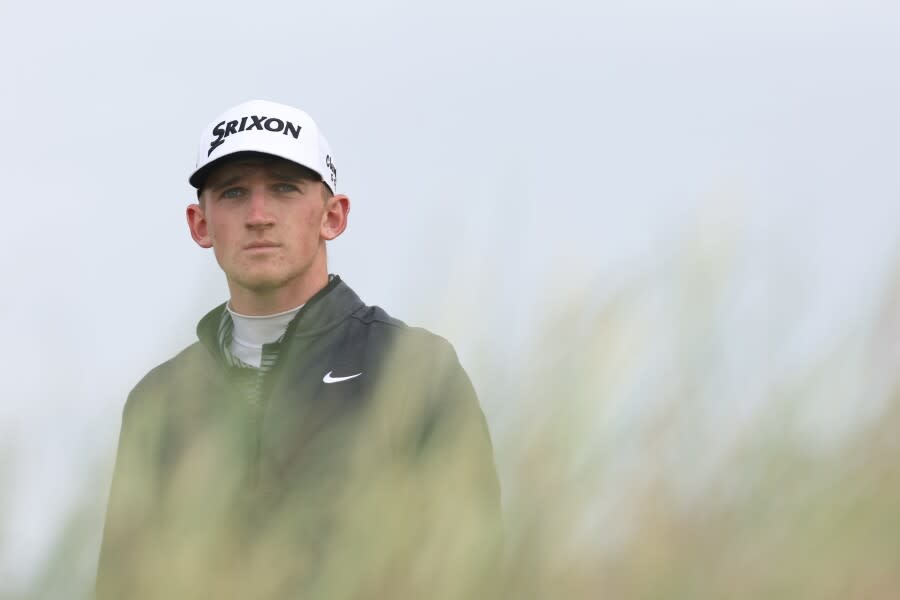

4. Texas Tech
Final 2023-24 rank: 14
2024 NCAA Championship finish: 17th
Returning: Calum Scott (Sr.), Matthew Comegys (Jr.), Tim Wiedemeyer (Soph.), Charlie DeLong (Sr.), Ben Gregg (Soph.), Price Hill (Soph.)
Departed: Tyran Snyders, Baard Skogen, Vincente Marzilio, Jack Wall
Arriving: Connor Graham (Fr.), Sean Keeling (Fr.), Luke D’Alise (Fr.)
Projected starting lineup: Scott, Comegys, Graham, Wiedemeyer, Keeling
Scouting report: It’s a common preseason message from coaches, but when Texas Tech head coach Greg Sands says, “Top to bottom, this is probably as good a team as we’ve had,” it’s easy to see why. It starts, of course, at the top with Scott, the long-hitting Scot who like Ludvig Aberg before him combines power and accuracy off the tee to set everything else up. The difference with Scott is he’s not shy about using his biggest weapon, his 2-iron. He found his rhythm last postseason, tying for second at the NCAA Baton Rouge Regional before posting a T-11 at La Costa. His strong summer was then highlighted by him capturing low-amateur honors at The Open. Scott will share leadership duties with Comegys, who was super consistent last spring with six top-25s before a wrist injury knocked him back at nationals. He took some time to get going again this summer, but he managed to make match play at the U.S. Amateur. Graham is one of the top incoming freshmen in the nation, a fearless talent and former Walker Cupper who under Scott’s tutelage should flourish. Wiedemeyer feels like a newcomer as well after not playing last season and struggling as a freshman while undergoing a swing change. Things have clicked this summer as Wiedemeyer tied for fifth at the European Amateur and made the Round of 32 at the British Amateur. “It’s hard when you’ve got that much depth and you’re trying to break into something where maybe you don’t fully believe you can,” Sands said of Wiedemeyer, “and now he’s going to have that belief behind him.” Keeling is another freshman who will get some run, DeLong is a former Nicklaus Award winner at the D-II level, and Gregg and Hill qualified for the U.S. Amateur this summer. The Red Raiders have the pieces to make match play at the NCAA Championship for just the second time in what would be, should they advance through regionals again this spring, a five-year run of qualifying for nationals.
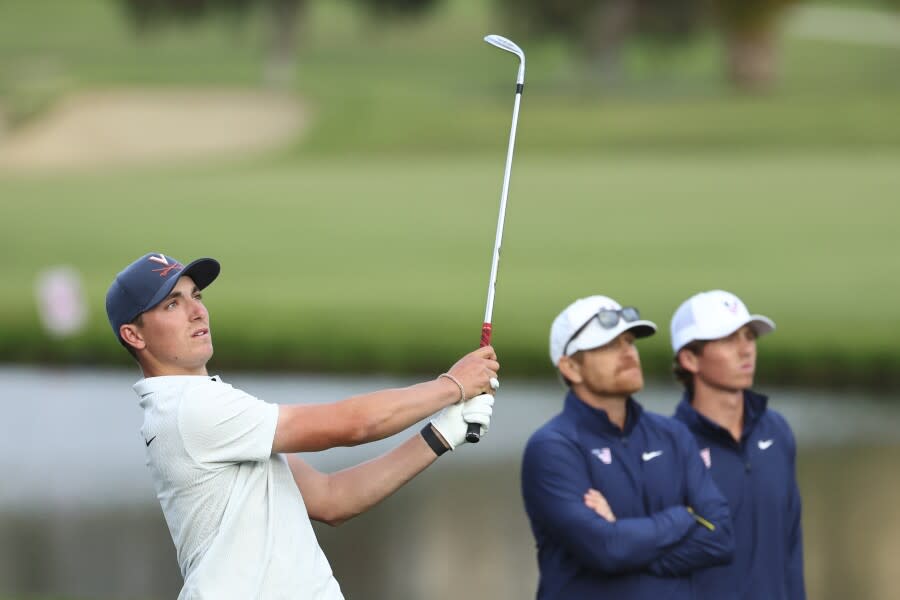

5. Virginia
Final 2023-24 rank: 8
2024 NCAA Championship finish: Quarterfinalist (T-3 in stroke play)
Returning: Ben James (Jr.), Bryan Lee (Jr.), Deven Patel (Sr.), Josh Duangmanee (Soph.), Paul Chang (Sr.), Henry Daly (Jr.), Benny Haggin (Sr.), Matthew Monastero (Sr.), Sam O’Hara (Soph.)
Departed: George Duangmanee, Liam Powderly, Chris Fosdick
Arriving: Maxi Puregger (Fr.)
Projected starting lineup: James, Lee, Patel, Duangmanee, Chang
Scouting report: This is the season where the Cavaliers turn the page from being a young team to transforming into a squad of experience, especially in the postseason. Virginia has now advanced to two straight NCAA match plays, and though it didn’t win a match either time, it did get eliminated by the eventual national champions, Florida two seasons ago and Auburn last season. “It’s hard to be disappointed because our program hadn’t done a lot of this historically,” head coach Bowen Sargent said. “We played well, but we ran into two hot teams both years. I think our time’s coming.” Leading the way are James and Lee. James’ struggles from two summers ago are long gone as he again was a first-team All-American last season, made the quarters at the Western Amateur this summer and then followed that by losing to eventual U.S. Amateur champion Josele Ballester in the first round of match play at Hazeltine. “If he makes putts, he’s maybe the best player in the world,” Sargent said of James. As for Lee, he’s been overshadowed by James since the two were Junior Ryder Cup teammates. Yet, Lee’s seven top-10s last season proved his value. Patel was in a rut last season before meeting with Sargent and re-dedicating himself to chasing a career at the next level; he won the Hayt not long after that. Duangmanee will no longer have his older brother around, but that could be good for the aggressive player who needs to develop a little more consistency this year. Chang’s story is well known at this point, and after tailing off last spring because of some ill-advised tweaks to his game, the former club golfer made the Round of 32 at the U.S. Amateur and has regained some momentum entering the fall. Daly, who couldn’t replicate a solid freshman season after transferring from Rice, and Puregger, a raw talent from Spain, could also challenge for a starting spot. There’s not crazy depth, but Virginia has one of the best first fives in the country and a potential Haskins winner in James.
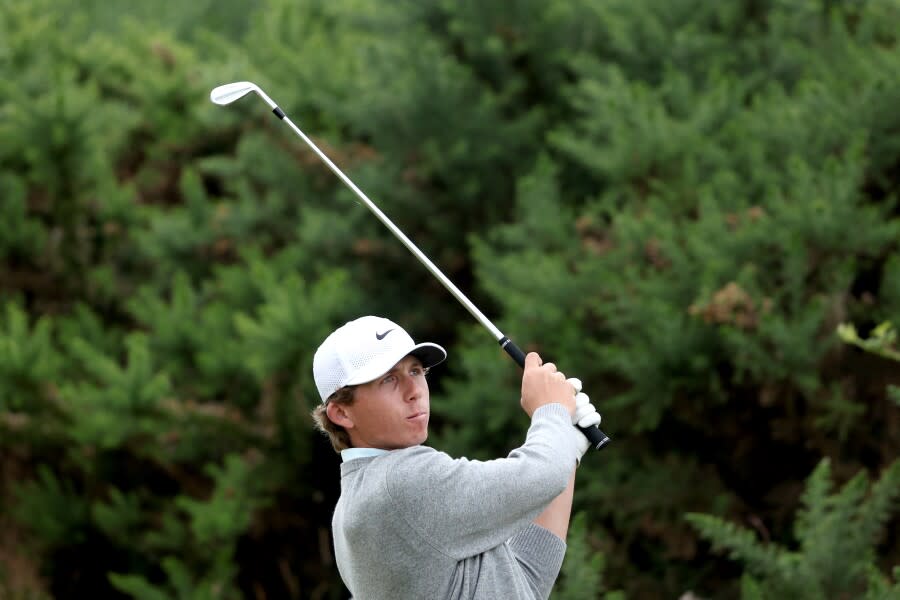

6. Vanderbilt
Final 2023-24 rank: 2
2024 NCAA Championship finish: Quarterfinalist (second in stroke play)
Returning: Gordon Sargent (Sr.), Jackson Van Paris (Sr.), Wells Williams (Jr.), Chase Nevins (Soph.), John Broderick (Jr.), Rowan Sullivan (Soph.), Ben Loomis (Jr.)
Departed: Cole Sherwood, Matthew Riedel, William Moll
Arriving: Ryan Downes (Fr.), Bowen Ballis (Fr.)
Projected starting lineup: Sargent, Van Paris, Williams, Downes, Broderick
Scouting report: Vanderbilt head coach Scott Limbaugh has had lots of success at the NCAA Championship (seven match plays in nine tries); his teams just haven’t quite gotten it done. Arguably no exit was tougher than the one last May at La Costa, where the senior-laden Commodores were upset in the quarterfinals by Ohio State. Now, Limbaugh must replace Sherwood, Riedel and Moll, who brought both great golf and great character to the first tee without fail. “That team was one I was especially close to, so to end it like that, that hurt never goes away to be honest with you,” Limbaugh said. “And I don’t really want that hurt to go away – I think that’s good for you to learn and grow – but we’re not going to dwell on it. We’re going to move forward with a new-look ball team this fall.” It’s the same at the top, where Sargent continues to be one of the country’s elite talents. But somehow, even with seven top-7s last season, including runners-up at regionals and nationals, Sargent was critiqued heavily. He only won once, and he struggled with big numbers that derailed some rounds. All that speed is tough for anyone to control, but that’s ultimately why Sargent decided to delay his PGA Tour membership until next summer and give it one more go with the Commodores; he knows he can get a lot better. “He’s a thermostat in any room he’s in,” Limbaugh said of Sargent, “but along with being that guy comes a lot of pressure, and those high expectations can take away your joy. … He’s just got to have fun, be an athlete and play golf.” Sargent will be counted on even more to mentor the young guys, but main leadership role will be shared by Van Paris, a former top-ranked junior who was slow to start his college career but turned it on as a junior with five top-15s and a T-10 in his PGA Tour debut at the Puerto Rico Open. Williams has been up and down through two seasons, but his win as a freshman in Cabo proves that he’s got a sky-high ceiling – and he joined both Sargent and Van Paris in making match play at the U.S. Amateur. After that, it’s anybody’s guess. Nevins had the best summer of the remaining guys, winning both the Porter Cup and Palmetto Amateur. Broderick played nicely back home, including finishing runner-up at the New England Amateur. Downes is a talented freshman with a big motor. All Limbaugh is looking for is some reliability behind his Big Three. “We’ve got some horses; let them do their thing,” Limbaugh said. “Not that these other guys can’t become that, but we just want to see some consistency with them.”
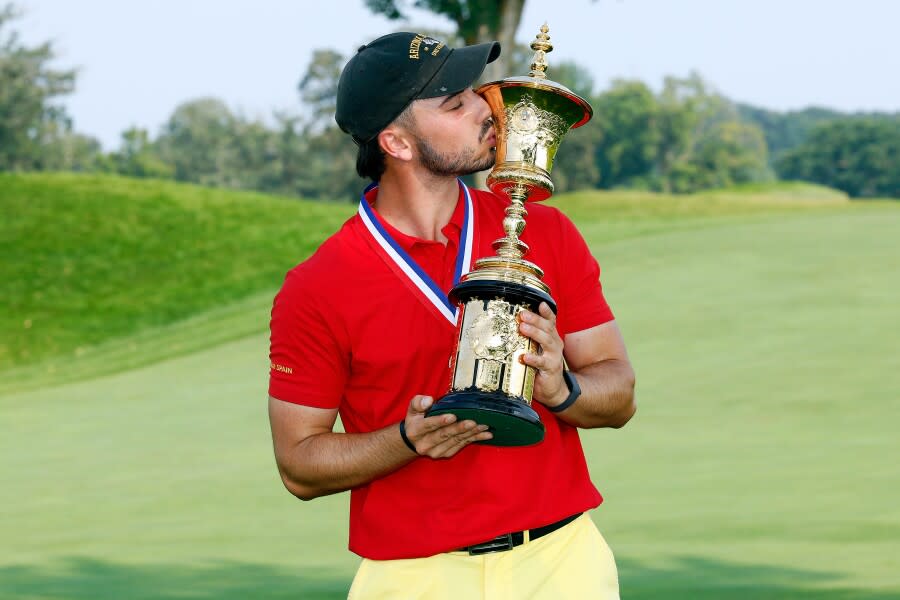

7. Arizona State
Final 2023-24 rank: 4
2024 NCAA Championship finish: DNQ
Returning: Preston Summerhays (Sr.), Josele Ballester (Sr.), Connor Williams (Soph.), Michael Mjaaseth (Jr.), Fifa Laopakdee (Soph.), Nick Prieto (Soph.)
Departed: Ryggs Johnston, Gabe Salvanera, Wenyi Ding (entered GAP ranking), Luke Potter (transferred to Texas), Anawin Pikulthong (transferred to Pepperdine), Kiko Coelho (transferred to Grand Canyon)
Arriving: Peer Wernicke (Fr.)
Projected starting lineup: Summerhays, Ballester, Williams, Mjaaseth, Laopakdee
Scouting report: The Sun Devils sure have taken some late-summer hits of late, going back to David Puig joining LIV Golf prior to the 2022-23 season and continuing this year with Wenyi Ding opting to leave school and enter the Global Amateur Pathway ranking, which if he maintains his top standing in, he’ll earn his DP World Tour card for next season. Ding’s departure follows several departures, whether to graduation (mainly Johnston) or transfer (mainly Potter, a former top-ranked junior). Plus, 2024 recruit Boston Bracken is deferring his eligibility for two years to go on an LDS mission. Luckily for Arizona State head coach Matt Thurmond, he can count on two heavyweights to lead this season in Summerhays and Ballester. Summerhays is a seasoned star, having won a U.S. Junior and starred on a Walker Cup team. He won twice last season, though some rocky results, including a T-50 at the NCAA Rancho Santa Fe Regional, where Arizona State failed to advance as a No. 1 seed, limited him to only third-team All-America status. Ballester’s stock, already high, soared after he won the U.S. Amateur last month. He’s surprisingly not won in college yet, though he does have eight career top-5 finishes at this level. Motivation is at an all-time high for both stars, not only because there is a sour taste left to rid following last spring’s disappointment but also because Summerhays and Ballester will start the fall ranked first and ninth, respectively, in PGA Tour U. Williams might be one of the best putters in college golf, and he capped a strong debut campaign with T-13 finishes at both conference and regionals – and he added top-13s at both the Trans-Miss and Pac Coast this summer. Mjaaseth took a step back as a sophomore, getting a little banged up and losing some confidence, but the expectation is that he will take two steps forward this season. Laopakdee is also healthier, and his ball-striking could see him enter the starting lineup, though Prieto and Wernicke will have some say. It’s a smaller roster than usual for Thurmond, but motivation certainly is not lacking. “That will always be in the back of our minds,” Thurmond said of last spring’s regional exit. “That was a pretty massive disappointment, and I think the whole team will be preparing to make sure we rectify that this year. We may not talk about it a ton, but it will be there, and we will be really excited to get back to regionals. I don’t think we’ll feel that’s history and that’s past until we make it to the NCAA Championship next year.”
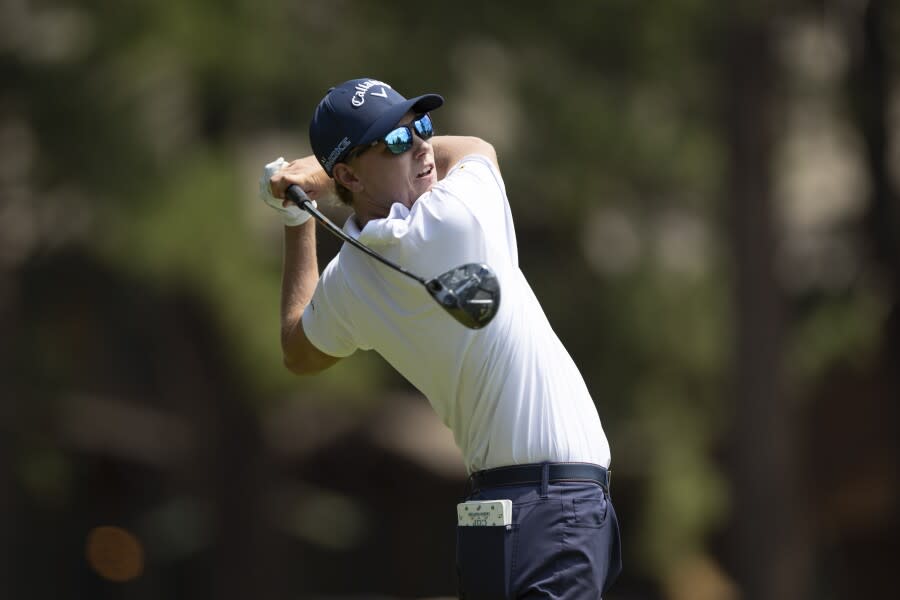

8. Florida
Final 2023-24 rank: 18
2024 NCAA Championship finish: 11th
Returning: Ian Gilligan (Sr.), Parker Bell (Jr.), Jack Turner (Soph.), Matthew Kress (Jr.), Rylan Shim (Fr.), Ryan Hart (Sr.), Luke Poulter (Soph.)
Departed: John DuBois, Quentin Debove, Tyler Wilkes, Joe Pagdin (transferred to TCU), Toby Bishop (transferred to Lipscomb)
Arriving: Zack Swanwick (Fr.), Parker Sands (Fr.), Joshua Bai (Fr., enrolling in January)
Projected starting lineup: Gilligan, Bell, Turner, Kress, Swanwick
Scouting report: It’s difficult not to be a prisoner of the moment with the Gators. I mean, the summer that Florida’s guys had was incredible. Gilligan, the former transfer from Long Beach State, is now a top-10 amateur in the world after making the quarters of the North and South Amateur, tying for 40th in his PGA Tour debut at the Barracuda and winning the Western Amateur. Gilligan beat Turner in that marathon Western final as the Gators had three of the four semifinalists that week (Bell was the other). “That was just an insane accomplishment,” Florida head coach J.C. Deacon said. “Now we’re dealing with the exact opposite issue of last year, which is expectations. Nobody thought anything of us last year, and now they think we’re pretty good, so we’re going to have to figure that out.” Florida excelled as the underdog last season after winning it all in 2023, placing 11th at La Costa. As Deacon said, that chip is gone – as is the leadership of Dubois, who despite a down year kept this team in order. Kress probably assumes the main leadership role as the Gators’ most disciplined player. And Gilligan, with great speed and great hands, is most likely to lead with his golf; he’s gotten way more comfortable in his new home, transformed physically, and his confidence is at an all-time high. “I think he can be in the player-of-the-year conversation this year for sure,” Deacon said. Bell is crazy long, but his maturation this past year is crazier, going from massively immature to a reliable teammate and student. If he progresses similarly this season, he can easily become an All-American. “I’ve never seen someone turn a second chance into what he has,” Deacon said of Bell. Turner tied Gilligan with a team-best five top-10s last season – his T-2 at SECs was his coming-out party – and he’s not looking back as he’s added some speed to his aspirational swing. Freshmen Swanwick, an Australian Junior champ, and Sands, who won the Western Junior this summer, will have opportunity to play a bunch, at least until Bai, last year’s U.S. Junior runner-up, arrives midseason. Hart and Shim, who redshirted last season, could surprise while Poulter, who at times last fall was the Gators’ best player, is nursing a back injury and probably won’t be ready to start the season. Florida has been prone to slow starts in recent seasons, so don’t panic if that trend continues, even after a blistering summer; Florida should have it figured out by the spring. “I know everyone says this, but I don’t think I’ve ever been so excited going into a season,” Deacon said.
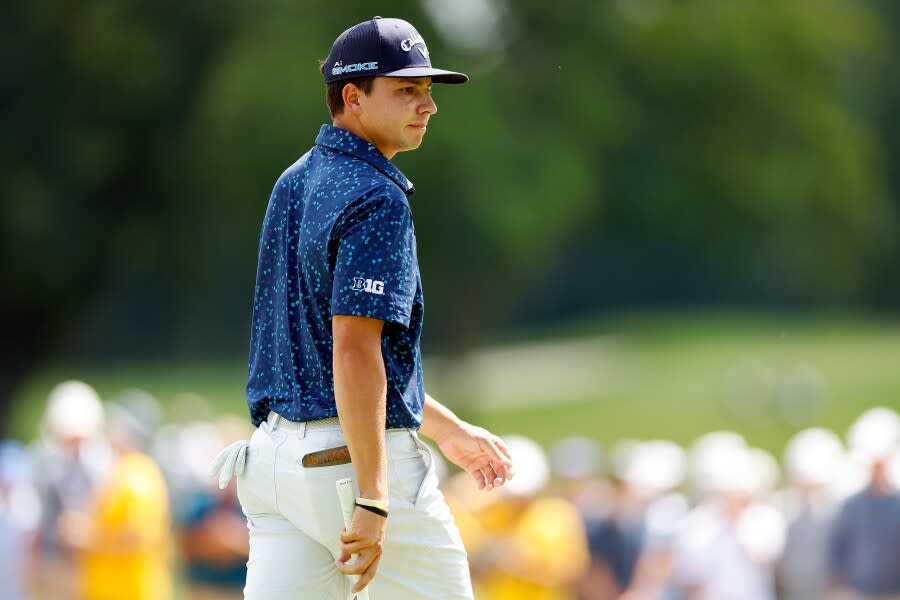

9. Illinois
Final 2023-24 rank: 6
2024 NCAA Championship finish: Quarterfinalist (first in stroke play)
Returning: Jackson Buchanan (Sr.), Max Herendeen (Soph.), Ryan Voois (Jr.), Ethan Wilson (Soph.)
Departed: Piercen Hunt, Tyler Goecke, Timmy Crawford, Jerry Ji, Adam Hunt
Arriving: Trey Marrion (Fr.), Joseph Buttress (Fr.), Jake Birdwell (Fr.)
Projected starting lineup: Buchanan, Herendeen, Voois, Wilson, Marrion
Scouting report: Illinois head coach Mike Small never recruits a player unless he believes that, at some point, they could win a Big Ten individual championship. So, as he prepares to rely on some unproven names at the back end of the starting lineup this season, there’s little concern. After all, Small “didn’t know what to expect” last season following the departure of first-team All-Americans Adrien Dumont de Chassart and Tommy Kuhl, and the Illini responded by winning stroke play at the NCAA Championship. This time around, the top of the lineup has remained intact with Buchanan, a recent U.S. Amateur semifinalist and the second-best putter Small has ever coached (behind only Nick Hardy), and Herendeen, a rising talent who has five top-5s, including an NCAA regional title and NCAA Championship runner-up, since losing in a playoff to Preston Summerhays in his college debut last fall at Sahalee. Voois is a brainiac who came on strong toward the end of last spring with a pair of postseason top-11s. Wilson didn’t make the postseason lineup, but he will have to step up this season or his spot could get taken by a freshman. This is a well-balanced class: Marrion won the North and South Junior and the Eastern Amateur this summer; Buttress is a promising Australian who last summer made the Round of 16 at the U.S. Junior; and Birdwell shared the 54-hole lead at the Junior Boys PGA in July before slipping to T-5. If one thing is certain, Illinois will get better as the season progresses. “That’s been our M.O. over the years,” Small said, “guys just gradually getting better, and they work at it and are disciplined, and they take ownership.”
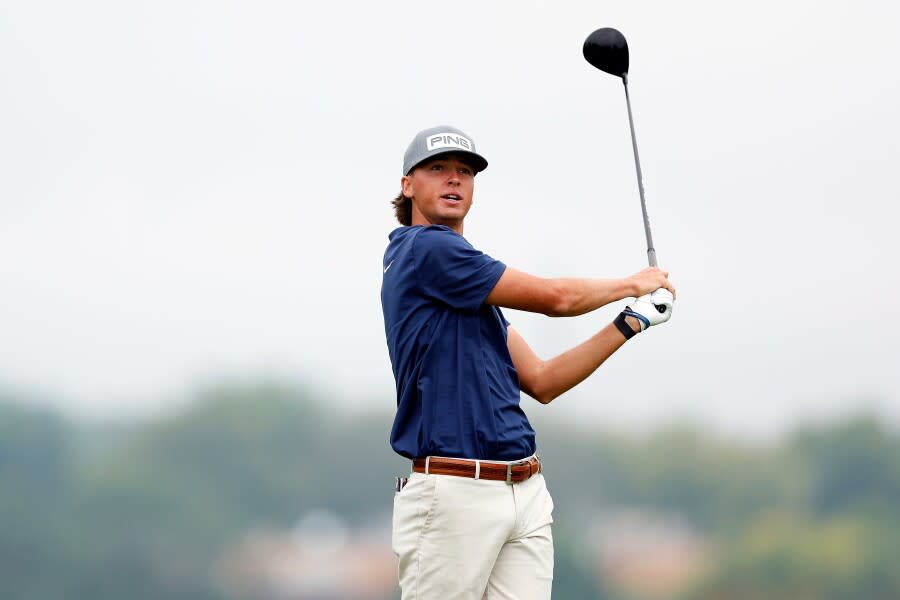

10. Ole Miss
Final 2023-24 rank: 10
2024 NCAA Championship finish: DNQ
Returning: Michael La Sasso (Jr.), Cameron Tankersley (Jr.), Kye Meeks (Sr.), Tom Fischer (Jr.), Collins Trolio (Soph.), Aidan Cohl (Soph.)
Departed: Tim Tillmanns, C.J. Easley, Patton Samuels (transferred to Austin Peay State)
Arriving: Cohen Trolio (Sr., transferred from LSU), Jacob Blanton (Fr.), Davis Gochenouer (Fr.)
Projected starting lineup: La Sasso, Tankersley, Meeks, Fischer, Coh. Trolio
Scouting report: If there’s one thing going for the Rebels this year it’s that Stanford is not hosting an NCAA regional. Ole Miss has had the worst luck at Stanford Golf Club under head coach Chris Malloy, whose squad, just like it did in 2019, finished a shot out of advancing to the NCAA Championship last spring. That bad luck, however, hasn’t been confined to just regionals at Stanford; since missing nationals in 2018, Ole Miss has made it past regionals just once, in 2022, so that’s certainly weighing heavily on this program. But the good news is the talent is there for the Rebels to start a new trend. La Sasso was the engine last season after transferring from N.C. State, and for most of the season he was one of the nation’s best, compiling eight straight finishes of T-18 or better before withdrawing from the SEC Championship with food poisoning. The stomach bug derailed La Sasso’s season – and ultimately the Rebels’ season as well. He hasn’t been the same since, though Malloy believes that getting him back on campus will reinvigorate the potential first-team All-American. Tankersley might not wow anyone with his tools, but his consistency and high floor make him the perfect complement to La Sasso. Meeks has struggled with confidence during his career, but all he needs to do is look at last spring, where he posted a couple top-6s and tied for 18th at regionals. He just needs to play more than seven events this year for Ole Miss to truly be great. Fischer was underrated coming out of high school, where he was teammates with Gordon Sargent, but his T-10 at regionals last season, Alabama State Amateur win and his breakout performance at the U.S. Amateur, where he won a match, shows he could take a huge step this year. While Fischer might be the sleeper, the X-factor is Cohen Trolio, who transfers in after a few tumultuous years at LSU. The talent is somewhere in there; it’ll be Malloy’s job to unlock it. It will be tough to knock those five guys from starting positions, though Collins Trolio seems like the most likely candidate.
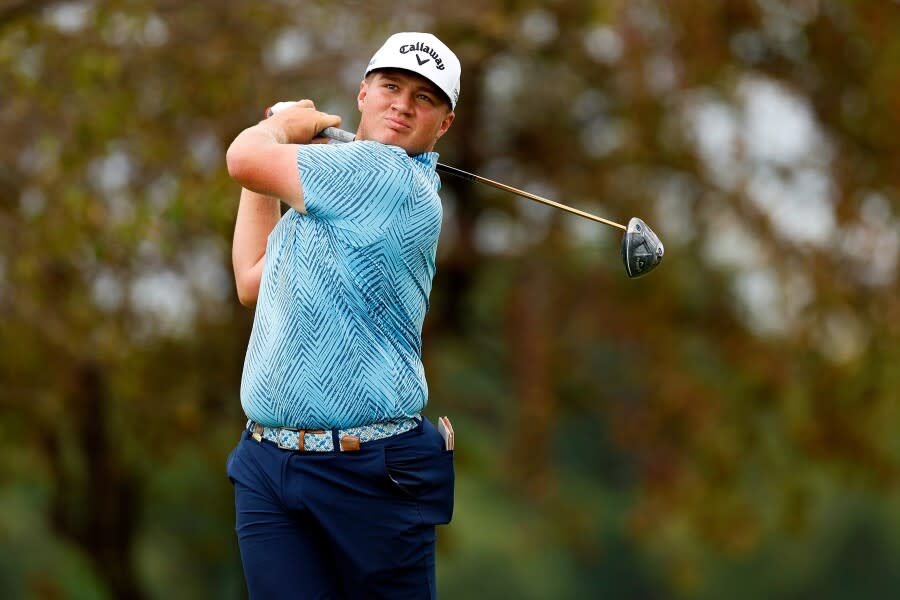

Rest of top 25
11. Tennessee: The Vols overcame the loss of Caleb Surratt to LIV Golf in January to not only qualify for the NCAA Championship but also finish 10th, the program’s best performance since 1980. Bryce Lewis and Jake Hall are now gone as well, but Tennessee returns two breakout players in junior Evan Woosley-Reed and sophomore Bruce Murphy, who combined for six top-10s last season. A healthy Josh Hill should see the starting lineup frequently, as should junior Lance Simpson, who heated up toward the end of last season and had two-top-5s in Elite Amateur Series events this summer. Of the freshmen, Jackson Herrington, also known as “The Fridge,” is the standout and could be an All-American off the bat. He won the Tennessee State Open this summer while making the Sweet 16 at the Western Amateur and Round of 32 at the U.S. Amateur. This is one of the deeper teams in the country with serious NCAA match play potential.
12. Texas: Few players had the type of summer that Tommy Morrison enjoyed. The 6-foot-9 junior advanced to the Round of 16 at the British Amateur, then won the European Amateur before making the cut at Royal Troon, missed match play via playoff at the Western Amateur and then bowed out in the Round of 32 at the U.S. Amateur. He and fellow juniors Christiaan Maas and Luke Potter (a transfer from Arizona State) will be leaned on heavily as the Longhorns, who lost Brian Stark and Nathan Petronzio to graduation and transfers Keaton Vo and Jacob Sosa, have big question marks behind them in sophomore Jack Gilbert, and freshmen Daniel Bennett and Eduardo Derbez Torres. But when you have three potential All-Americans, depth matters less. An 18th straight NCAA Championship appearance seems likely.
13. Texas A&M: The Aggies probably underperformed last season with just one win and a T-20 at the NCAA Championship, but they lose just one player, Daniel Rodrigues, and replace him with blue-chip recruit Wheaton Ennis, the Arizona Amateur champion and a Round-of-32 qualifier at the U.S. Amateur. Senior Phichaksn Maichon is a surefire All-SEC talent, junior Jaime Montojo qualified for The Open this summer and senior Michael Heidelbaugh should be a consistent presence in the starting lineup again. But there will be a lot of competition at the back end of the starting five. Keep an eye on sophomore Aaron Pounds, who hasn’t had a great summer but will enter the fall healthy.
14. Duke: The Blue Devils finished seventh at the NCAA Baton Rouge Regional last season, but they lose just one starter in Ian Siebers and have seen a number of players dazzle this summer. Senior Luke Sample, junior Ethan Evans and sophomore Bryan Kim all made match play at the U.S. Amateur while Sample also reached the semifinals of the British Amateur. If former AJGA player of the year Kelly Chinn can get it going again – he doesn’t have a top-10 since the 2023 NCAA Norman Regional – Duke can flirt with NCAA match play.
15. Arizona: The Wildcats return the bulk of their roster from last season’s squad that finished 15th at nationals with the graduated Sam Sommerhauser and transfer Yannick Malik (ETSU) being the biggest departures. But the trio of senior Tiger Christensen, junior Filip Jakubcik and junior Zach Pollo combined for 11 top-10s, including three wins, last season. Sophomore Tianyi Xiong and incoming freshman Matej Baca are among the X-factors who have a lot to prove.
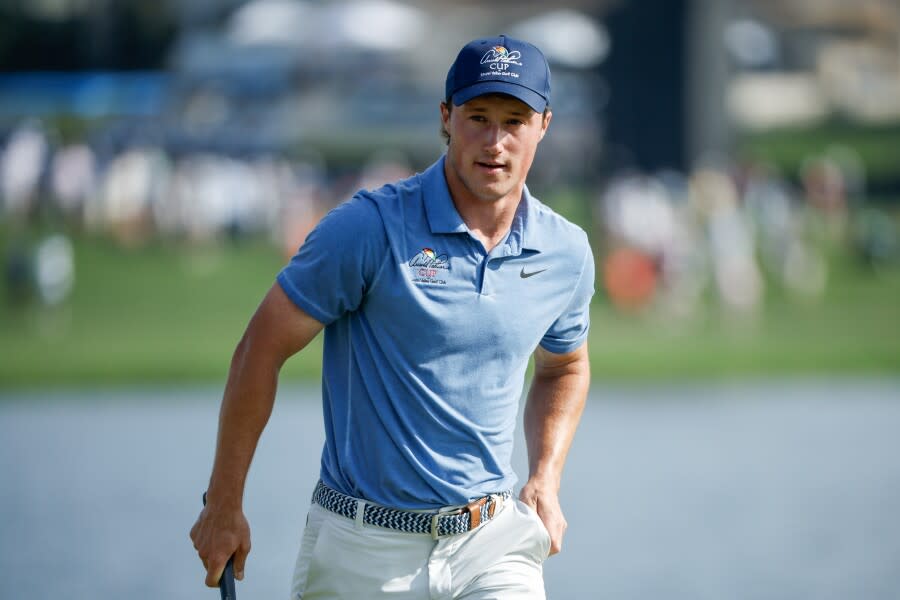

16. North Carolina: After being the conversation as the nation’s top team the past few seasons, the Tar Heels will take a step back – at least to start the fall – following the departures of Austin Greaser, Dylan Menante and Peter Fountain. Seniors David Ford and Maxwell Ford sit atop the lineup, though the former has been plagued recently by a hip injury and the latter had a poor summer, finishing outside the top 100 at the Southern, Western and U.S. amateurs. David Ford will avoid surgery, though it will certainly be something he has to manage moving forward. Behind them is where things get a little murky. There will be more qualifying than we saw with the veteran-laden teams of the past with sophomore Hampton Roberts, transfer Keaton Vo and four freshmen, headlined by Ethan Pascal, all with the opportunity to play a lot.
17. Oklahoma State: The Cowboys would’ve looked quite a bit different if not for landing Cal transfers Eric Lee and Ethan Fang, the latter of whom advanced to the quarterfinals of the U.S. Amateur. Sophomore Preston Stout, last spring’s co-Big 12 individual champion, is locked in atop the lineup after the graduation of Jonas Baumgartner, and sophomore Gaven Lane will have a sizable role. Five freshmen will be among those battling for a fifth spot that could give Oklahoma State some headaches at times.
18. LSU: What can new head coach Jake Amos do in Year 1? Bringing in two of his studs from ETSU, senior Algot Kleen and junior Matty Dodd-Berry, will help. As will Missouri transfer Alfons Bondesson, who had a better freshman year than sophomore year. Sophomore Jay Mendell is the best of the holdovers from the previous administration. The Tigers can go fairly deep, so if the transition is smooth, there’s no reason they can’t make a return to trip to the NCAA Championship.
19. UCLA: With senior Omar Morales, who had seven top-10s last season, knocking on the door of the top 10 in the World Amateur Golf Ranking, the Bruins have a legit Haskins Award contender. Fellow senior Pablo Ereno came on last spring and will be another key cog. If sophomore Luke Powell plays like he did last fall when he won once and added another top-5 finish, we should see UCLA back at the NCAA Championship for the first time since 2018.
20. Georgia Tech: After two straight years of winning at least one match at the NCAA Championship, the Yellow Jackets have a tall task in replacing Christo Lamprecht and Bartley Forrester. Junior Hiroshi Tai showed just how good his good is by winning the NCAA individual title, but now that he’s the guy, he could stand to be a little more consistent. Sophomores Carson Kim and Kale Fontenot gained some huge experience last season, and freshman Albert Hansson will probably be counted on similarly this year. The key could be junior Ben Reuter, who redshirted last season after being a regular starter the season prior; he’s coming off a win at the Dutch National Stroke Play.
21. Pepperdine: It’s probably safe to say the Waves won’t have to worry about succumbing to the .500 rule again this season. The rebuild is over, and Pepperdine returns its entire roster, which is headlined by juniors Mahanth Chirravuri and Brady Siravo, and sophomores Kris Kuvaas and William Walsh. Freshman Byungho Lee was a top-10 player in his class, and Columbia transfer Nathan Han could be a nice surprise. Obviously, there is potential for volatility here without a clear-cut All-American, but there’s no denying there is potential.
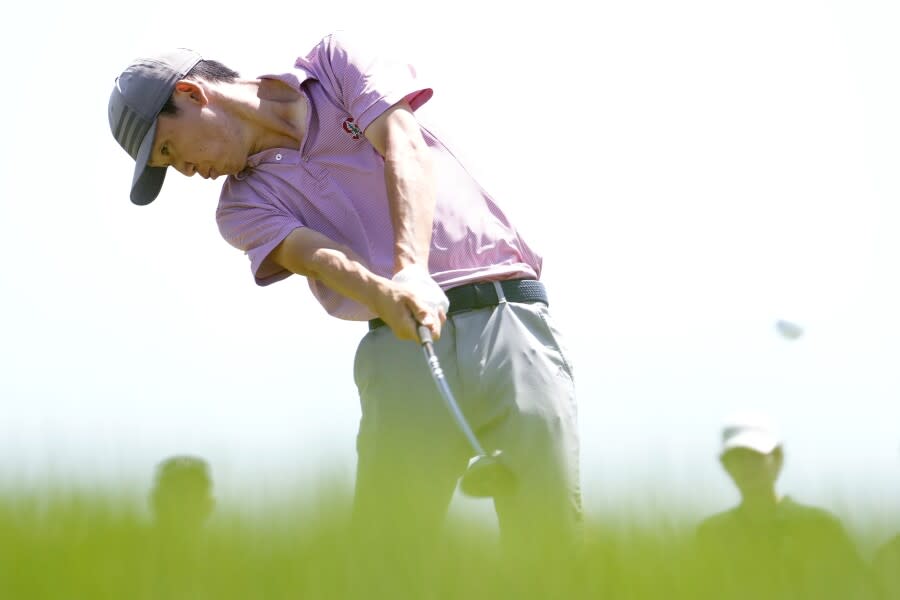

22. Stanford: Speaking of young teams, the Cardinal are just that following the departures of All-Americans Michael Thorbjornsen, Karl Vilips and Barclay Brown. That’s a lot of firepower to replace, but Stanford will attempt to fill a large part of that void with two freshmen – T.K. Chantananuwat, who won an Asian Tour event at 15 years old and is now nearly a top-50 amateur in the world who is fresh off a Round-of-32 showing at the U.S. Amateur, and Jay Leng Jr., who also won a match at Hazeltine and was a U.S. Junior semifinalist this summer as well. If Harvard transfer Brian Ma adjusts quickly, and the Cardinal get more out of sophomores Ethan Gao and Kush Arora, suddenly this is a team reloaded and not rebuilding.
23. Alabama: Credit to the Tide for scrapping together an inspired spring after Nick Dunlap turned pro and just missing advancing out of regionals by a shot. But now is where things get tougher as you lose seniors Canon Claycomb, Thomas Ponder and J.P. Cave. Junior Jonathan Griz is the best of the returners and with a college win to his credit, though he didn’t crack the top 30 while playing a busy summer schedule. Getting Stetson transfer Dominic Clemons, who was runner-up at the British Amateur, was crucial, and if freshmen Nicholas Gross and William Jennings can adjust quickly, Alabama is still a top 10 team in a loaded SEC.
24. San Diego State: The Aztecs return four of five starters from last season’s squad that finished sixth at the NCAA West Lafayette Regional. Senior Justin Hastings has turned into potential All-American, and he narrowly missed match play at both the Western Amateur and U.S. Amateur. Fellow senior Shea Lague battled some inconsistency after a standout sophomore season; if he returns to form and freshman Harry Takis of Australia is as good as advertised, we’ll see San Diego State back at nationals for the first time since 2021.
25. Colorado: Perhaps the biggest surprise in the top 25, the Buffaloes bring back essentially their entire roster from last season’s squad that only failed to make an NCAA regional because of the .500 rule. Senior Justin Biwer qualified for regionals as an individual last season, junior Hunter Swanson led the team with three top-10s, and senior Dylan McDermott made match play at the U.S. Amateur and should be considered a potential breakout player. There’s some sneaky depth here, too, with sophomores Ty Holbrook and Brandon Knight (not the former NBA player).
The list
TOP 25
1. Auburn
2. Florida State
3. Oklahoma
4. Texas Tech
5. Virginia
6. Vanderbilt
7. Arizona State
8. Florida
9. Illinois
10. Ole Miss
11. Tennessee
12. Texas
13. Texas A&M
14. Duke
15. Arizona
16. North Carolina
17. Oklahoma State
18. LSU
19. UCLA
20. Georgia Tech
21. Pepperdine
22. Stanford
23. Alabama
24. San Diego State
25. Colorado
NEXT 10
26. Georgia
27. SMU
28. South Florida
29. BYU
30. Wake Forest
31. South Carolina
32. West Virginia
33. Notre Dame
34. Arkansas
35. Utah
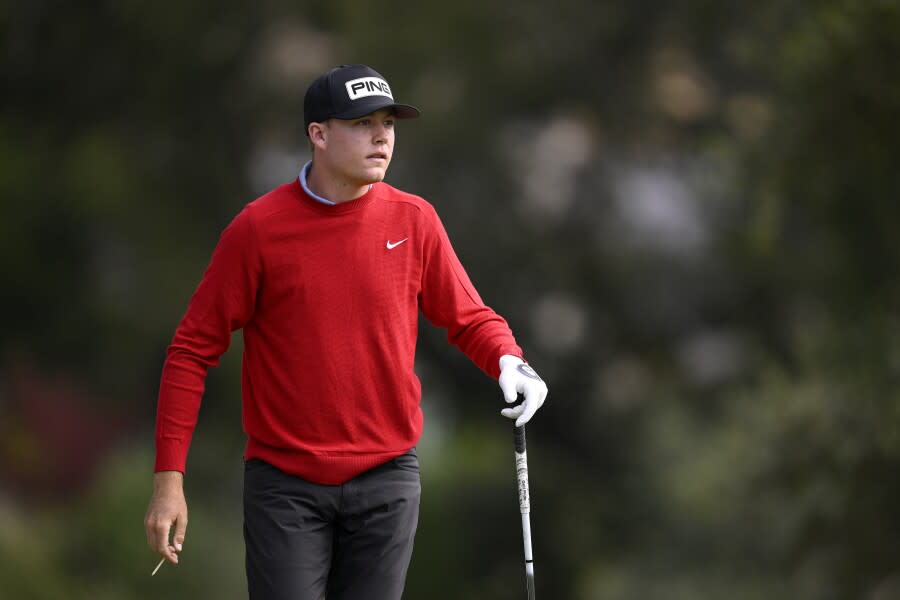

Preseason All-Americans
FIRST TEAM
1. Luke Clanton, Florida State
2. Jackson Koivun, Auburn
3. Calum Scott, Texas Tech
4. Preston Summerhays, Arizona State
5. Gordon Sargent, Vanderbilt
6. Ben James, Virginia
7. Brendan Valdes, Auburn
8. Jose Ballester, Arizona State
9. Jackson Van Paris, Vanderbilt
10. Jackson Buchanan, Illinois
SECOND TEAM
11. Max Herendeen, Illinois
12. Ian Gilligan, Florida
13. Drew Goodman, Oklahoma
14. Omar Morales, UCLA
15. David Ford, North Carolina
16. Tommy Morrison, Texas
17. Jase Summy, Oklahoma
18. Michael La Sasso, Ole Miss
19. Christiaan Maas, Texas
20. Phichaksn Maichon, Texas A&M
THIRD TEAM
21. Bryan Lee, Virginia
22. Filip Jakubcik, Arizona
23. Carson Bacha, Auburn
24. Josiah Gilbert, Auburn
25. Parker Bell, Florida
26. Hiroshi Tai, Georgia Tech
27. Tyler Weaver, Florida State
28. Tiger Christensen, Arizona
29. Jackson Herrington, Tennessee
30. Wells Williams, Vanderbilt
HONORABLE MENTION
31. T.K. Chantananuwat, Stanford
32. Preston Stout, Oklahoma State
33. Luke Sample, Duke
34. Pablo Ereno, UCLA
35. Noah Kent, Iowa
36. Algot Kleen, LSU
37. Justin Hastings, San Diego State
38. Lance Simpson, Tennessee
39. Matthew Comegys, Texas Tech
40. Gray Albright, Florida State
